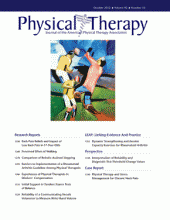Abstract
Background and Purpose Chronic neck pain is prevalent in the workplace. Research suggests that psychosocial stress may contribute to the development of neck pain by causing excessive or prolonged muscle activity in some individuals. The purpose of this case report is to describe the rationale, development, and implementation of stress management as an adjunct to standard physical therapist management of chronic neck pain in a female office worker who responded to psychosocial stress with elevated muscle activity prior to treatment.
Case Description A 44-year-old female office employee with an 8-year history of chronic neck pain participated in this case report. The patient was selected from a group of research participants who demonstrated elevated electromyographic (EMG) activity of the trapezius muscle in response to simulated occupational stressors. The multidisciplinary intervention consisted of 8 physical therapy sessions, supplemented by 8 stress management sessions that included EMG biofeedback and psychotherapy to facilitate muscle relaxation.
Outcomes Neck disability decreased by 50%, trait anxiety decreased by 21%, and the duration of trapezius muscle rest in the workplace increased by 56% immediately after the 8-week intervention. These improvements were maintained 6 months after treatment, and the patient reported a complete absence of neck disability at the 2-year follow-up assessment.
Discussion A sustained reduction in neck disability was observed for a patient with chronic neck pain after participating in a multidisciplinary intervention that combined physical therapy and stress management approaches to facilitate muscle relaxation in the workplace. Future clinical trials are needed to assess whether stress management is a useful adjunct therapy for patients with chronic neck pain who show elevated muscle activity in response to psychosocial stress.
Footnotes
Dr Bruflat, Ms Balter, and Dr Maluf provided concept/idea/project design and project management. Dr Bruflat, Ms Balter, Dr Fethke, and Dr Maluf provided writing and data analysis. Dr Bruflat, Ms Balter, Dr McGuire, and Dr Maluf provided data collection. Dr Maluf provided fund procurement and institutional liaisons. Dr McGuire and Dr Maluf provided the patient and facilities/equipment. Dr Bruflat, Dr Fethke, and Dr Maluf provided consultation (including review of manuscript before submission).
This work was supported by a Career Development Award from the Colorado Clinical and Translational Science Institute (NIH KL2RR025779) and NIH R01AR056704 to Dr Maluf.
- Received December 30, 2011.
- Accepted June 5, 2012.












